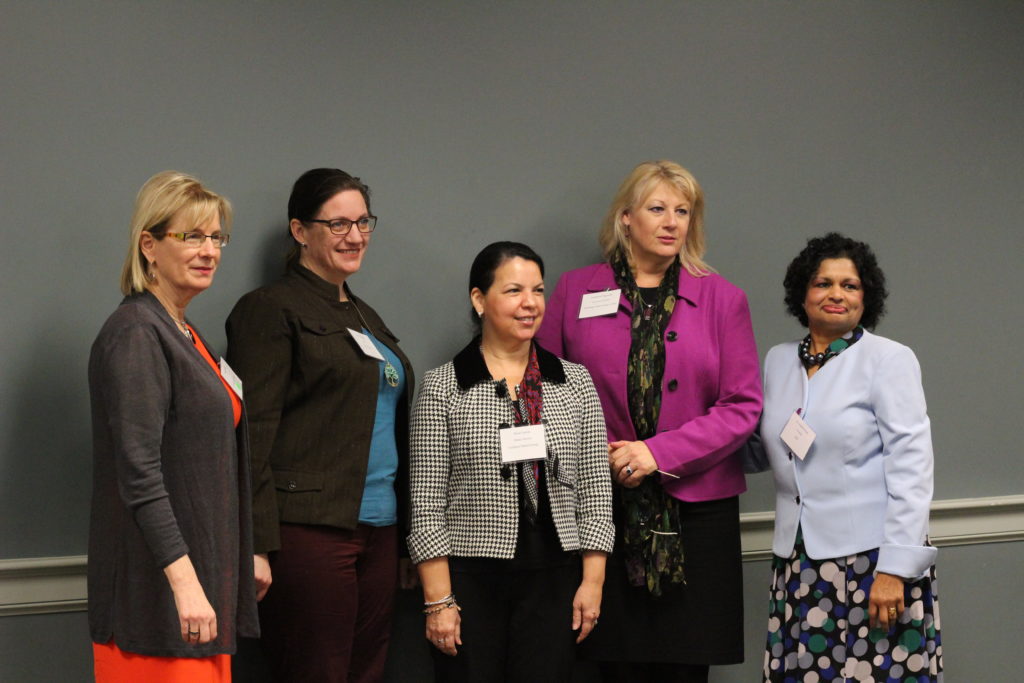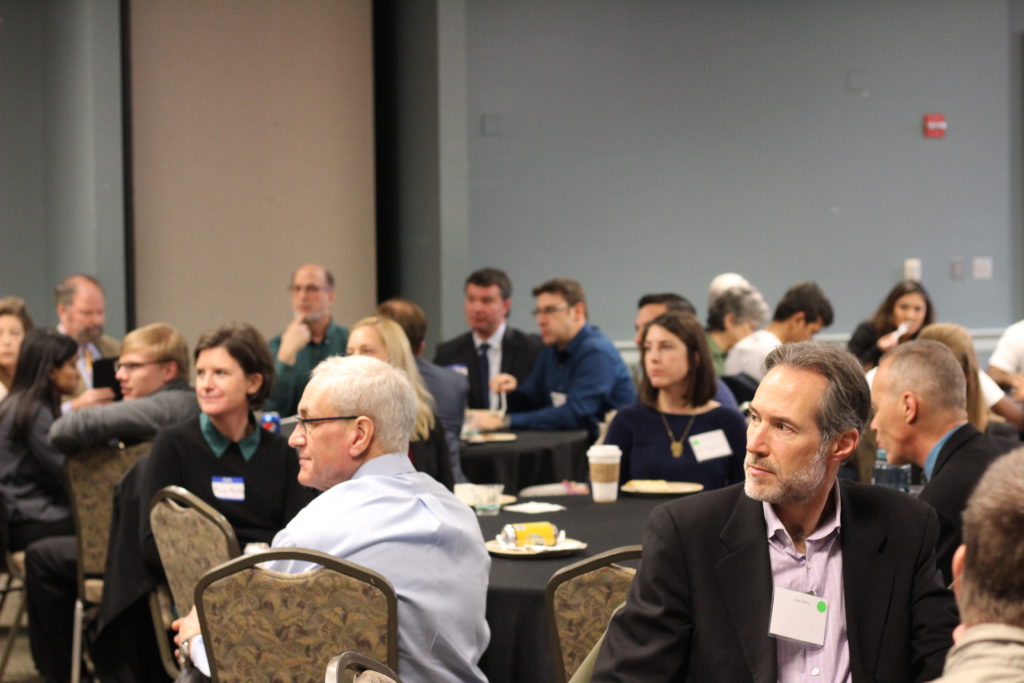 By APARAJITA BANERJEE
By APARAJITA BANERJEE
Gender inequality is acute in the energy sector, especially in fossil fuels. People interested in the clean energy space recognize that the sustainability of the energy sector is increased when stakeholders make diversity and inclusion a priority. Therefore, as energy systems are reconfigured toward more renewable systems, gender equality should be addressed and prioritized.
The 4th Annual Energy and Sustainability Extravaganza at University of Maryland (UMD), College Park on February 23, 2018 began with a sold out opening luncheon panel for the Council of Women in Energy and Environmental Leadership (CWEEL). The panel showcased three exceptional women who have championed sustainable energy movements in their respective fields. Find more about the panel here.
John Lord, President of the Association of Energy Engineers-National Capital Chapter (AEE NCC) kicked off the panel, which was particularly special this year, as the Association of Energy Engineers formally recognized their UMD Student Chapter. UMD students guided by Dr. Farah Singer, Faculty Research Associate, Center for Environmental Energy Engineering, received an official plaque that formally recognized the UMD chapter.

Critical insights of panelists on the journey of their career in energy business
In her welcoming remarks, Janine Finnell, Executive Director, Leaders in Energy, recounted how she met Dr. Nandini Mouli and the other panelists. These illustrate the value of how networking can help in building valuable relationships that may be useful later in your professional life. Both Finnell and Mouli serve on the Council on Women in Energy and Environmental Leadership or known as (CWEEL) Board for the Association of Energy Engineers (AEE), which works to help women in the energy industry. This CWEEL event is held annually and is one of the most popular events, and it appeals to both men and women.
The panel was moderated by Nandini Mouli, Ph.D., of eSai LLC and Board Member of the AEE-Baltimore Chapter. Each panelist shared how they got to where they are now.
Rosa Cassidy, Deputy Director at Lockheed Martin Energy, has been a science enthusiast from her childhood and is a mechanical engineer by training. She strives to encourage women and the Latino and Hispanic communities to consider career paths in the clean energy field. Drawing examples from her personal and professional life, Katherine Magruder, Executive Director of the Maryland Clean Energy Center, explained how it is possible for women, or for any individual, to bring change in the world, even in small ways that can create ripples of meaningful impacts. A mother of seven who spent 15 years raising her young family, Laurie Vaudreuil, CEO of Mosaic Power, shared her own experience of how being a mother with strong family-oriented values helped her to learn critical management skills. These would turn out to be critical in developing her own sustainable energy business.
The common theme was that creativity helps in fulfilling oneself and in adapting to changing situations. These competencies are critical in having a successful career in the clean energy sector, where much remains unexplored and uncharted.
Women in the energy sector
As the central theme of the panel session was to explore, learn, and encourage women participation in the energy sector, the panelists shared their perspective on female participation in the rapidly evolving renewable energy sector.
All agreed that continuous learning, by identifying gaps and then bridging them, is key to advancing oneself and building a career in the energy sector. It is important to have a willingness to explore new avenues outside your comfort zone.
Another tip was to understand the historical context and the needs of any person, community, or business situation, without making assumptions. Women need to explore energy research and development, as it offers the potential to change the energy landscape. Just as nurturing and sustaining comes naturally to women, so too can they enrich their professional lives in the energy sector with similar approaches to their own businesses and careers.
Way forward and challenges
Given the vast potential that exists in the cleantech world, how do people prepare themselves for careers in the sector, and what kinds of skill sets are essential to acquire?
Magruder pointed out that the jobs available in the industry are not only primary jobs but also secondary and tertiary jobs that are spinoffs from the rapidly growing sector. Jobs are created in many different areas, such as generation, transmission, and distribution of energy, design, engineering and systems management, research and development, HVAC and weatherization efforts, manufacturing, and mobility and transportation. Secondary jobs are also created in functions like sales, services, construction, installation, investment, finance, policy, and regulation of clean energy technologies. Therefore, the energy sector provides opportunities for a wide range of skill sets.
Magruder also shared data from the U.S. Census Bureau showing that in the 1st quarter of 2013, there were over 109,000 jobs generating over $8.2 billion in wages and salaries in Maryland linked with the clean energy sector. These numbers are going up each year, showing promising signs for the economy of the state as well as for a more sustainable future. Federal policies have been vital in helping the sector grow. Future job potential also lies in cybersecurity and protecting the grids. Cassidy pointed out that data analytics and internet of things are other critical areas for job growth, as data will increasingly help to make critical decisions. Vaudreuil drew attention to the point that apart from technology development, communication is key to business growth.

Dr. Mouli asked the panelists to comment on how to increase female participation in the cleantech world. Cassidy pointed out that mentoring other women is crucial to ensure that future leaders that can carry on the bastion of growth are created. Magruder added that it is equally essential to be coachable and build meaningful relationships by following up on commitments. She also pointed out that policies are always evolving, and one should also keep track of it. Vaudreuil said that listening to others is fundamental, especially for solving problems and creating new avenues of growth.
All concurred that a firm belief in dreams can help to achieve your goals for the future because that belief gives you focus. Going outside your comfort zone to learn something new adds new colors to the canvas of life. The panelists also said that it is also critical to be true to oneself and own our talents, as well as our weaknesses, for continuous self-development. Being true to oneself brings to the table more diversity of views, opinions, and perspectives, thus helping systems to flourish. Contradicting voices can help in finding and fine-tuning effective solutions.
To begin a career in the cleantech world, it is imperative to get the ball rolling with internships and making one’s presence felt. Make people aware about your skills and potential. Be a continuous learner, and be conscious and alert. As the energy sector is rapidly evolving, and as more and more policies are being enacted to support the sector, new opportunities are being created. These opportunities require a new set of entrepreneurs to take up new challenges and convert them into thriving business opportunities.
Aparajita Banerjee, Ph.D. in Environmental and Energy Policy, is interested in exploring how effective policies can be framed and implemented to transition to a sustainable and alternative future. Her expertise are in bioenergy and renewable energy, sharing and circular economy, and degrowth. Apart from publishing in different peer-reviewed journals, she has recently co-edited a book titled “Environmental Policy and the Pursuit of Sustainability.”
Photos courtesy of Rachel Baker.


Leave a Reply